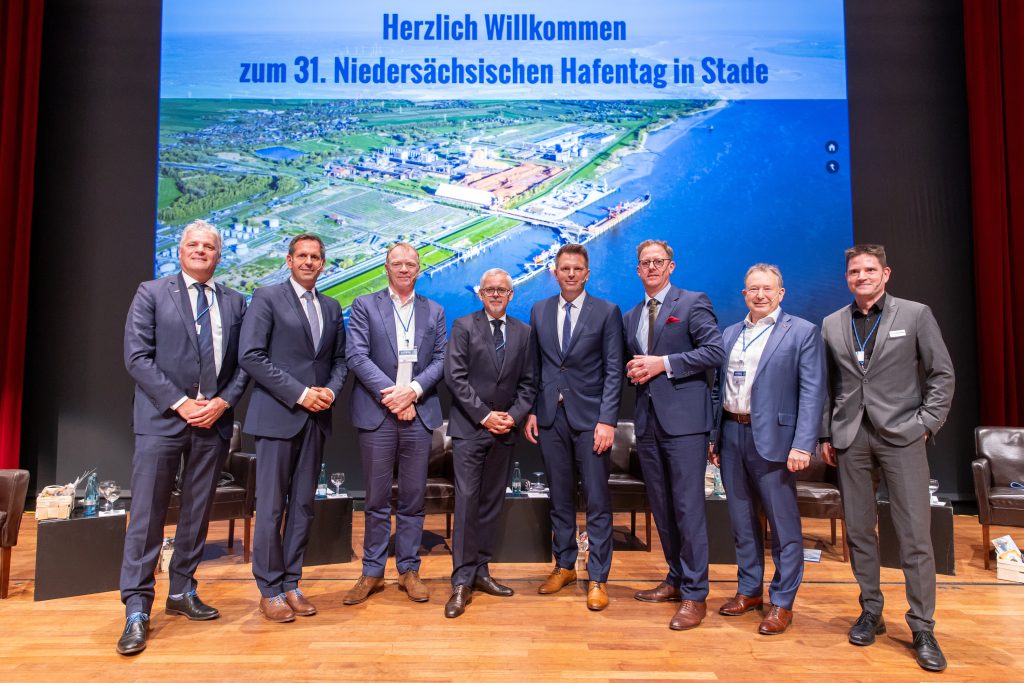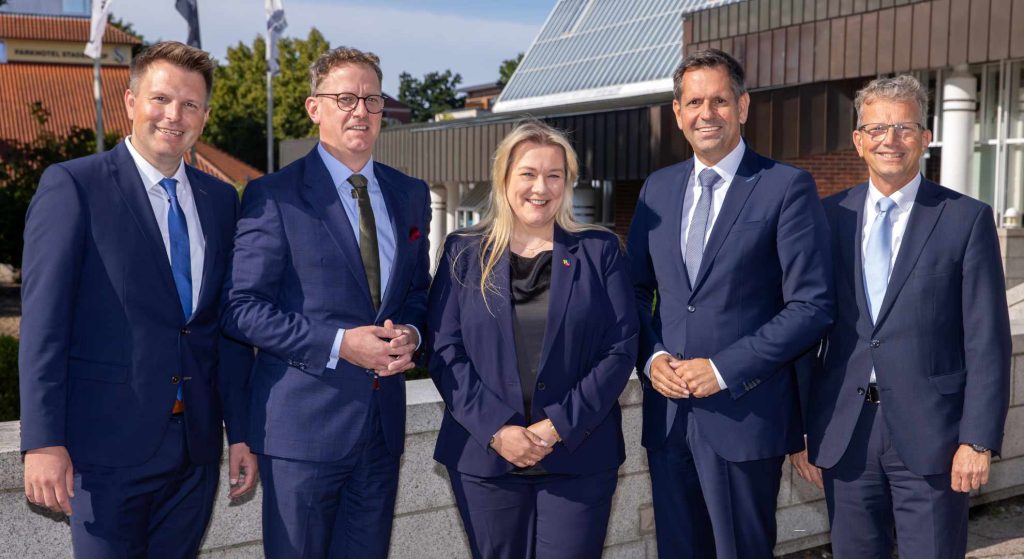Economics Minister Lies: "Investments in ports and their connectivity are becoming a national task."
Stade, 01. September 2023 – For the 31st time, around 250 participants from business, politics and administration met today for the Niedersächsischen Ports Day. A panel discussion on the topic of "Niedersachsens seaports - for the energy world of tomorrow" with Niedersachsens Minister of Economics Olaf Lies and high-ranking representatives from business and science rounded off the official program.
Coming together, discussing, networking - In front of around 250 guests from business, politics, administration and the press, André Heim, Managing Director of the port marketing company Seaports of Niedersachsen GmbH, today opened the 31st Lower Saxony Ports Day at the seaport of Stade, which is celebrating its 50th anniversary this year.
Traditionally, the current developments in Niedersachsens seaports are discussed at the Ports Day. In the first half of 2023, the universal port group handled a total of around 26.17 million tons in maritime traffic (26.74 million tons in 2022), which is 2% below the previous year's result and significantly above the level of the first two Corona years.
"However, considering the current weak global demand as a result of high inflation, increased interest rates and the very high energy prices due to the war in Ukraine, we can be satisfied with the bottom line. With growth of around 15%, the handling of liquid bulk goods developed significantly positively; at the LNG terminal in Wilhelmshaven alone, around 1.5 million tons of liquefied natural gas were handled up to and including June. We registered declines in the area of solid bulk cargoes, with around 25% less being loaded over the quaysides here. While large quantities of coal were still being handled at the beginning of the year, temporary shutdowns of power plant operations resulted in declining volumes. Also due to the high energy price level in Germany, it was hardly possible for energy-intensive industry to produce at competitive prices, which had a corresponding impact on handling volumes, particularly in the seaport of Stade. Around 1.3 million tons less were handled here, which naturally had a significant impact on the overall statistics. At 293,535 standard containers (TEU), the volume handled at the EUROGATE Container Terminal in Wilhelmshaven fell by almost 16 percent. Significant declines in global freight and container volumes on the high-volume trade lanes Asia-Europe, Transpacific and Transatlantic contributed to this result, among others. Some 827 thousand new vehicles were handled in the first half of the year, an increase of a good 20 percent year-on-year, A. Heim said during his opening remarks.
The first deputy mayor of the Hanseatic city of Stade and member of the state parliament, Ms. Melanie Reinecke, drew attention to the companies of the Stade seaport in her welcoming speech: "The Stade seaport and the companies located there have helped Stade to prosperity. If the Stade seaport and the companies located there are doing well, then the city is also doing well. Because, as in the Hanseatic era, ports stand for trade, prosperity, innovation and business."
Niedersachsens Economics Minister Olaf Lies explains why investments in ports and their connections are becoming a national task: "Efficient and future-proof ports and reliable hinterland connections are a basic prerequisite for foreign trade, security of supply, implementation of the energy transition and national security in Germany. All regions and economic sectors of our country are equally dependent on this. The development of our ports must therefore be assessed as a joint task for the whole of Germany and finally given top priority. Due to our geographic location alone, Niedersachsen will play the central role in the energy turnaround."
The official part was rounded off by a panel discussion entitled "Niedersachsens seaports - for the energy world of tomorrow". Chaired by Oliver Detje (DVV Media Group), Economics Minister Lies and representatives from business and science, such as Dr. Neldes Hovestad (Dow Germany), Michael de Reese (Lower Saxony Seaports Working Group), Dr. Johann Killinger (Hanseatic Energy Hub), Holger Bär (VCI Nord and Olin International) and Dr. Dennis Kruse (Deutsche WindGuard) discussed the developments and challenges facing Niedersachsens seaports and their role in the context of the energy transition.
Michael de Reese, spokesman for the Niedersachsen Seaports Working Group, emphasizes: "The seaports in Lower Saxony are ready to make a decisive contribution to the expansion of wind energy. However, in order to achieve the expansion targets by 2030, extensive investments in seaport infrastructure are necessary." De Reese appeals to the federal government to take responsibility and create the necessary framework conditions for the implementation of the energy turnaround.
The 31st Niedersächsische Port Day once again proved to be a successful network meeting and an established format. Following the event, guests had the opportunity to take part in a port bus tour. A special highlight was the view of Germany's currently largest hydraulic construction site, the jetty for liquefied gases, which is currently under construction.
31st Niedersächsische Port Day in Stade.
Von links: Dr. Neldes Hovestad (Dow Deutschland), Olaf Lies (Niedersächsischer Minister für Wirtschaft, Arbeit, Verkehr und Digitalisierung), Dr. Johann Killinger (Buss Group), Moderator Oliver Detje, André Heim (Geschäftsführer Seaports of Niedersachsen), Michael de Reese (Sprecher der Arbeitsgemeinschaft Niedersächsische Seehäfen), Holger Bär (VCI Nord / Olin International) und Dr. Dennis Kruse (Deutsch Winguard). Foto: Andreas Burmann / Seaports



